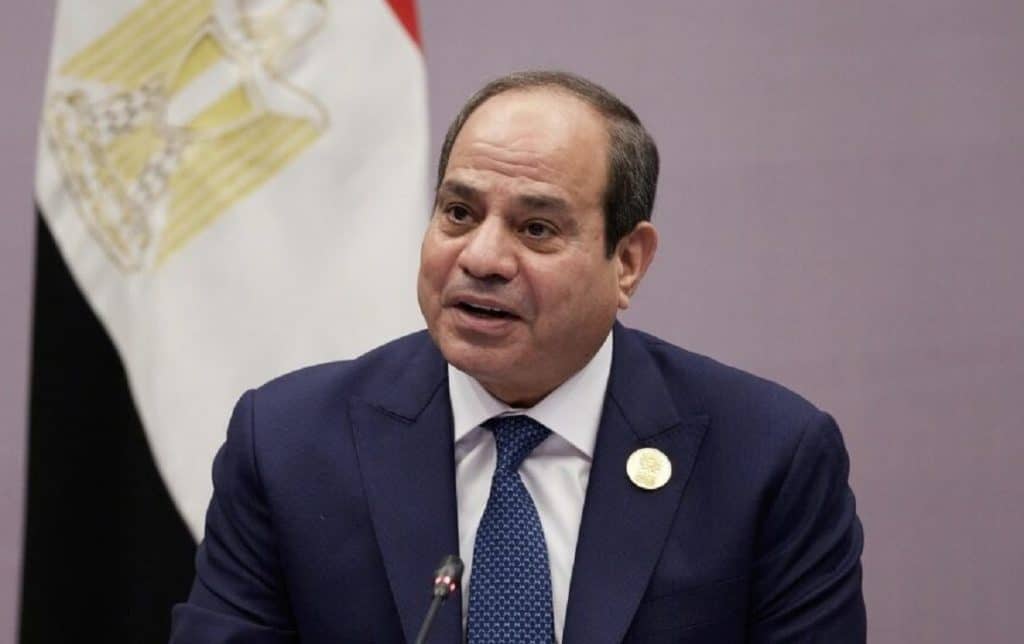By Eslam Abdelmagid Eid
Countries in the Eastern Mediterranean region continually dispute over the definition of their common maritime borders.
Due to the complexity of the situation in Libya, with its prevailing state of instability, and the different interests of the Libyan parties towards the countries in the region, as the Western Libya tends to Turkey, while the Eastern Libya has a good relation with Egypt and Greece.

Therefore, everyone was surprised when President Sisi decided to unilaterally define Egypt’s western maritime boundaries in the Mediterranean, notifying it to the United Nations. This decision created a new reason for conflict over the Mediterranean basin, which is rich in oil and natural gas. However, indicators show that the impact of this new episode in the conflict is much milder than previous ones, as it is possible that a relative consensus among the countries in the region is behind this decision.
The details of the decision and its actual goals
The presidential decree issued by President Al-Sisi, defining Egypt’s western maritime boundaries, stipulates that Egypt’s territorial sea boundaries start from point No. 1 of the Egyptian-Libyan land boundary for a distance of 12 nautical miles to point No. 8, and then Egypt’s western maritime boundary line starts from point No. 8 in a northerly direction, parallel to meridian 25 east, to point No. 9, provided that such a decision is notified by Egypt to the United Nations.
The decision is considered pre-emptive by the Egyptian side, with the aim of preserving Egypt’s gains from natural gas in the Mediterranean, in conjunction with recent oil discoveries in that region. The border demarcation carried out unilaterally by Egypt will allow Egyptians to explore for natural gas and, consequently, foreign companies to carry out permanent exploration. As this Egyptian step is a legal one, it can prevent Egypt from entering into disputes with neighboring countries in the Mediterranean region.
Egypt will gain significant material and investment benefits from this step. In fact, until now it has not been possible to sign a joint agreement between the countries in the region to delineate the maritime boundaries. With the notification to the United Nations, Egypt’s decision has become official. In turn, the United Nations will inform Libya and other neighboring countries of this decision. For years, international oil companies refused to participate in work in those areas because they were considered conflict zones. Egypt had no choice but to unilaterally demarcate, as its main objective now is to well prepare these areas to present them to companies for gas exploration.
Moreover, Egypt is aware of the importance of the decision, regardless of the external repercussions, as the Mediterranean basin region contains more than 200 trillion cubic feet of gas and what has been discovered so far has not exceeded only 10 percent of the present reserves. The U.S. company Chevron, which is working in the field of exploration for a new gas field in the Mediterranean region, specifically opposite the city of Al-Arish, has greatly encouraged Egypt to make such a bold decision to increase its share of gas in the Mediterranean.
The impact of the decision on relations with neighboring countries
Egypt will not face any obvious problems as a result of its unilateral demarcation of the border with Libya, as the Libyan parties are currently not in agreement with each other on the nature of relations with external parties. Egypt essentially does not recognize the legitimacy of the Dabaiba government in Tripoli. Moreover, the Dabaiba government does not control the eastern region, which is located on the land and sea border with Egypt, while the latter has good relations with Khalifa Haftar, commander of the Libyan National Army, and the government of Fathi Bashagha, which are located in eastern Libya, where the common border with Egypt is located.
As a result, the parties in eastern Libya adhered to relative neutrality toward the issue, while there was a predictable objection from the Dabaiba government, which considered the Egyptian decision to be an unjust demarcation under international law, arguing that Egypt carried out the demarcation unilaterally. But at the same time, the legitimacy of the Dabaiba government itself is questionable, due to the expiration of the Geneva Accord on June 21, 2022, which makes the Dabaiba government’s position surely weak should it want to make sensitive decisions in this regard or trigger an international escalation.
Egypt also assures that its allies in the region, such as Cyprus and Greece, with whom Egypt has previously demarcated maritime borders, will be satisfied with the decision, and thus there will be no crisis between them as partners in the natural gas sector in the eastern Mediterranean. Especially since Egypt may have informed the Greek foreign minister in advance during his recent visit to Egypt in late November. Indeed, there had been talk of this step in the past, and perhaps the signing of several joint agreements by the Egyptian and Greek sides during the visit testifies to the understanding between the two countries on their respective movements in the energy field.
On the other hand, Egyptian relations with Turkey are currently at their highest level since President Sisi took office, following the bilateral meeting that brought President Sisi and his counterpart Erdogan together in Qatar last month. The two sides also held bilateral meetings on intelligence issues. There is no doubt that the energy sector is the most important point of common interest for both sides. So Egypt may have informed Turkey during these meetings of its intention to undertake the demarcation decision.
Moreover, Turkish President Erdogan does not currently have many cards to play with Egypt, after the foreign ministers of Turkey and al-Dabiba’s government signed an agreement last October to search for gas in Libyan waters. Indeed, the latest move on the Egyptian side may be a response to that step as well. This is also in view of the fact that Erdogan’s current focus is on preparing for next year’s presidential elections. To that end, he is trying to reconcile with his opponents in order to gain the trust of voters within Turkey, as Erdogan’s disputes with Turkey’s neighbors have come under great criticism from the Turkish opposition and the local population in general. Egypt is certainly the most important of these neighboring countries, which means that the Turkish side will not be rigid or clearly opposed to this Egyptian step, as Erdogan’s election campaign is very much focused on restoring Turkish relations with both Egypt primarily and Assad’s Syria to a relatively lesser extent.
Author: Eslam Abdelmagid Eid (Academic, political researcher, and specialist in Middle East affairs)
(The views expressed in this article belong only to the author and do not necessarily reflect the editorial policy or views of World Geostrategic Insights).







